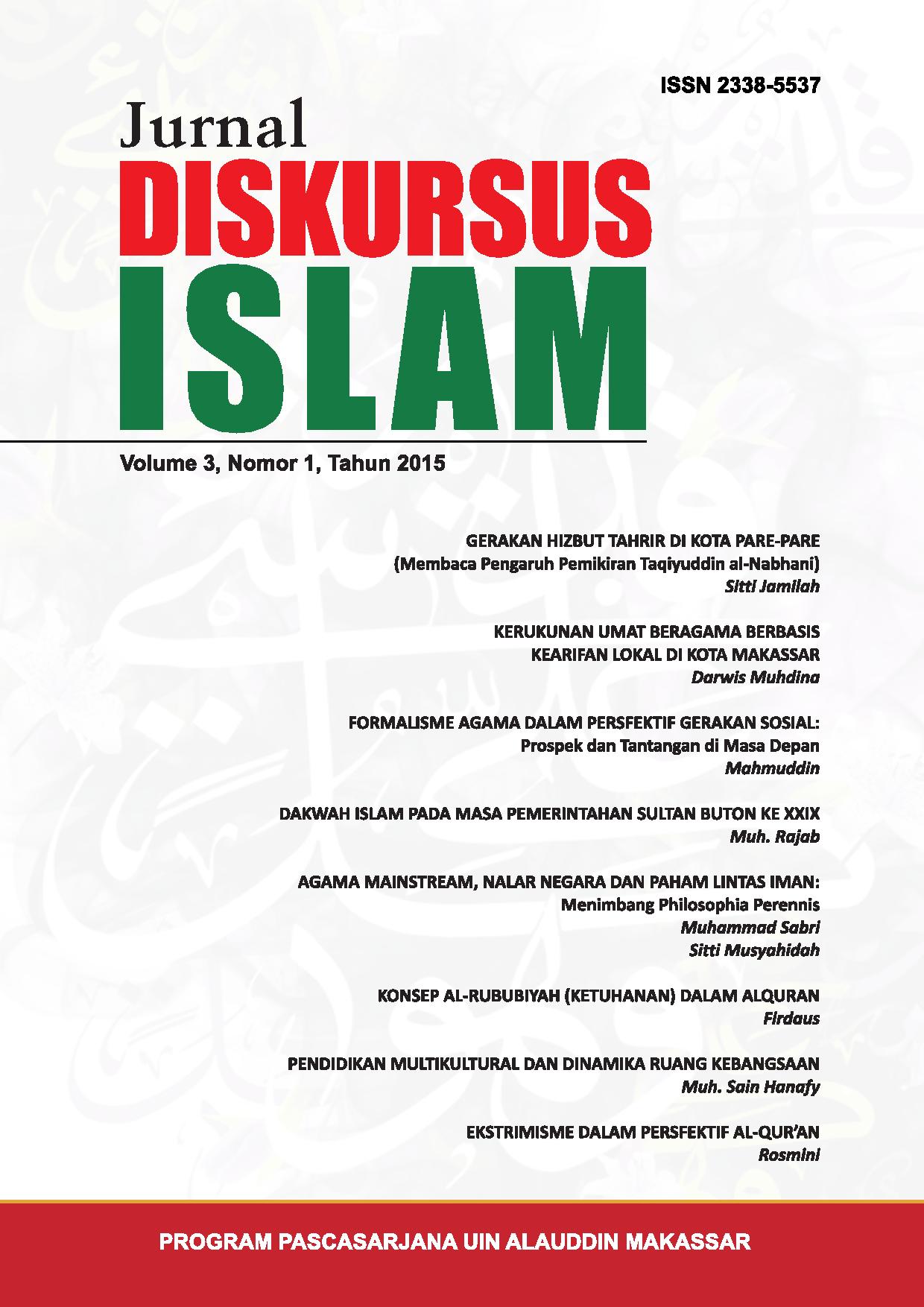Soul In Islamic Perspective (Surgery of Anatomy of the Soul from Various Perspectives)
Abstract
The purpose of writing is to find out the soul in the Qur'an and the perspectives of Muslim philosophers about the soul . The soul is defined as something in a physical form that is materially attached to human beings, visible and not hidden, but at other times it has a meaning as something in a non- material form that flows in the human body as a substance (jauhar) , spirit substance or thinking substance. In the Koran there are two terms that are often used to capture the meaning of the soul, namely ruh (spirit) and nafs . The word nafs in its various forms of derivation is found in 63 letters or 55,26 % of the total number of letters contained in the Qur'an. The word nafs has various meanings including: First, Nafs as self or someone, Second, Nafs as the self of God, Third, Nafs as spirit. Fourth, Nafs as a soul. The philosophy of the soul put forward by Muslim philosophers is an infusion of Greek philosophy which they later developed by drawing closer to Islamic teachings. According to Muslim philosophers, the soul is a spiritual substance as a place for the body. The relationship between the unity of the soul and the body is a coincidence, in which both stand alone and have different substances, so that the destruction of the body does not bring destruction to the soul. The soul remains eternally alive and will feel torment or suffering
References
Abd al-Baqi, Muhammad Fuad. Mu’jam al-Mufahrasy li al-Fadli al-Qur’an al-Karim. Beirut: Dar al-Fikr, 1994.
Ahmad ibn Faris ibn Zakariya’, Abu al-Husain. Mu‘jam Maqayis al-Lughah, Juz V (tt: Dar al-Fikr, tt.)
al-‘Arabiyah, Majma‘ al-Lugah. Al-Mu‘jam al-Falsafi. Kairo: Al-Hai’at al-‘Ammah, li al-Syu’un al-Matabi‘ al-Amiriyah, 1983.
Al-Ghazali, “Kimiya’ al-Sa’adah“, dalam al-Munqidz min al-Dhalal. Bairu: Maktabah al-Sya’biyyah
Al-Raziq, Mustafa‘Abd. Tahmid li Tarikh al-Falsafah al-Islamiyyah. Kairo: Muhammad ‘Ali Syubayh, 1959.
Chaplin, J.P. Kamus Lengkap Psikologi. Jakarta: Rajagrafindo Persada, 2006.
De Boer, T. J. The History of Philosophy in Islam. New York: Dover Publication Inc, 1967.
Departemen Pendidikan dan Kebudayaan. Kamus Besar Bahasa Indonesia. Balai Pustaka, 1990.
Fakhri, Majid. Sejarah Filsafat Islam, terjemahan dari A History of Islamic Philosophy, oleh Mulyadhi Kartanegara. Jakarta : Pustaka Jaya, 1987.
Fuad al-Ahwaniy, Ahmad. al-Falasifah al-Misriyyah. Kairo: al-Maktabah al-S|aqafiyyah, 1962. h. 10-18
Hana al-Fakhuri dan Khalil al-Jar, Tarikh al-Falsafah alArabiyyah. Bairut: Dar al-Ma’arif
Huzain, Muhammad. “Al-Nafs dalam Filsafat Islam: Kajian Kritis terhadap Pemikiran tentang Jiwa”, Jurnal Kajian Keislaman 1, no. 1 (2020): h. 34-46.
Huzain, Muhammad. “Al-Nafs dalam Filsafat Islam: Kajian Kritis terhadap Pemikiran tentang Jiwa”, Jurnal Kajian Keislaman 1, no. 1 (2020)
Kementerian Agama RI. Al-Qur’an dan Terjemahnya. Bandung: Diponegoro, 2014.
M, Afrizal. “Pemikiran para Filosof Muslim tentang Jiwa “, Jurnal Pemikiran Islam 30, no. 1 (Januari-Juni 2014): h. 1-17.
M, Afrizal. “Pemikiran para Filosof Muslim tentang Jiwa “, Jurnal Pemikiran Islam 30, no. 1 (Januari-Juni 2014).
Manzur, Ibnu, Muhammad Ibnu Mukarram al-Anshari, Lisān al-‘Arab, Juz 8. Kairo: Dar al-Misriyah li al-Ta’lif wa al-Tarjamah, 1968.
Maskawaih, Ibn. Tahzib al-Akhlaq, terj. Helmi Hidayat, Menuju Kesempurnaan Akhlak (Bandung: Mizan, 1995.
Muhammad Ikbal Salam, Andi. “Al-Nafs dalam Filsafat Islam: Kajian Kritis terhadap Pemikiran tentang Jiwa”, Jurnal Kajian Keislaman 1, no. 1 (2020): h. 34-46.
Muslim, Sahih Muslim, juz II. Cet. II; Beirut: Dar al-Kutub al-‘Ilmiyyah, t.th.
Nasr, Seyyed Hossein & Oliver Liaman. History of Islamic Philosophy, diterjemahkan oleh Tim Mizan dengan judul Eksiklopedi Tematis Filsafat Islam. Bandung: Mizan, 2003.
Nasution, Harun. Falsafat dan Mistisisme dalam Islam. Jakarta: Bulan Bintang, 1992.
Nasution, Harun. Islam Rasional; Gagasan dan Pemikiran (Cet. III; Bandung: Mizan, 1995.
_______. Filsafat Agama. Jakarta : Bulan Bintang, 1983.
Rajabi, Mahmoud. Insan Syenazi, terj. Yusuf Anas, Horison Manusia. Cet. I; Jakarta: Al-Huda, 2006.
Sheikh, M. Seed. A Dictionary of Muslim Philosophy. Lahore: Institute of Islamic Culture, 1976.
Supriyadi, Dedi. Pengantar Filsafat Islam. Bandung: Pustaka Setia, 2019.
Syarif, M. M. History of Muslim Philisophy, penyunting Ilyas Hasan, Para Filosof Muslim. Bandung: Mizan, 1994.
Taha Abu al-Dahab, Asyraf. Al-Mu‘jam al-Islam. Kairo: Dar al-Syuruq, 2002.
Yasir Nasution, M. Manusia Menurut Al-Ghazali. Jakarta: Srigunting, 1988.
Zar, Sirajuddin. Filsafat Islam, Filosof dan Filsafatnya. Jakarta: Rajawali Press, 2010.
Copyright (c) 2024 Rizqy Mutmainnah Amin, Hamzah Harun Ar-Rasyid , Haeril Haeril

This work is licensed under a Creative Commons Attribution-ShareAlike 4.0 International License.
Authors who publish with this journal agree to the following terms:
1) Authors retain copyright and grant the journal right of first publication with the work simultaneously licensed under a Creative Commons Attribution License that allows others to share the work with an acknowledgement of the work's authorship and initial publication in this journal.
2) Authors are able to enter into separate, additional contractual arrangements for the non-exclusive distribution of the journal's published version of the work (e.g., post it to an institutional repository or publish it in a book), with an acknowledgement of its initial publication in this journal.
3)Authors are permitted and encouraged to post their work online (e.g., in institutional repositories or on their website) prior to and during the submission process, as it can lead to productive exchanges, as well as earlier and greater citation of published work (See The Effect of Open Access).








